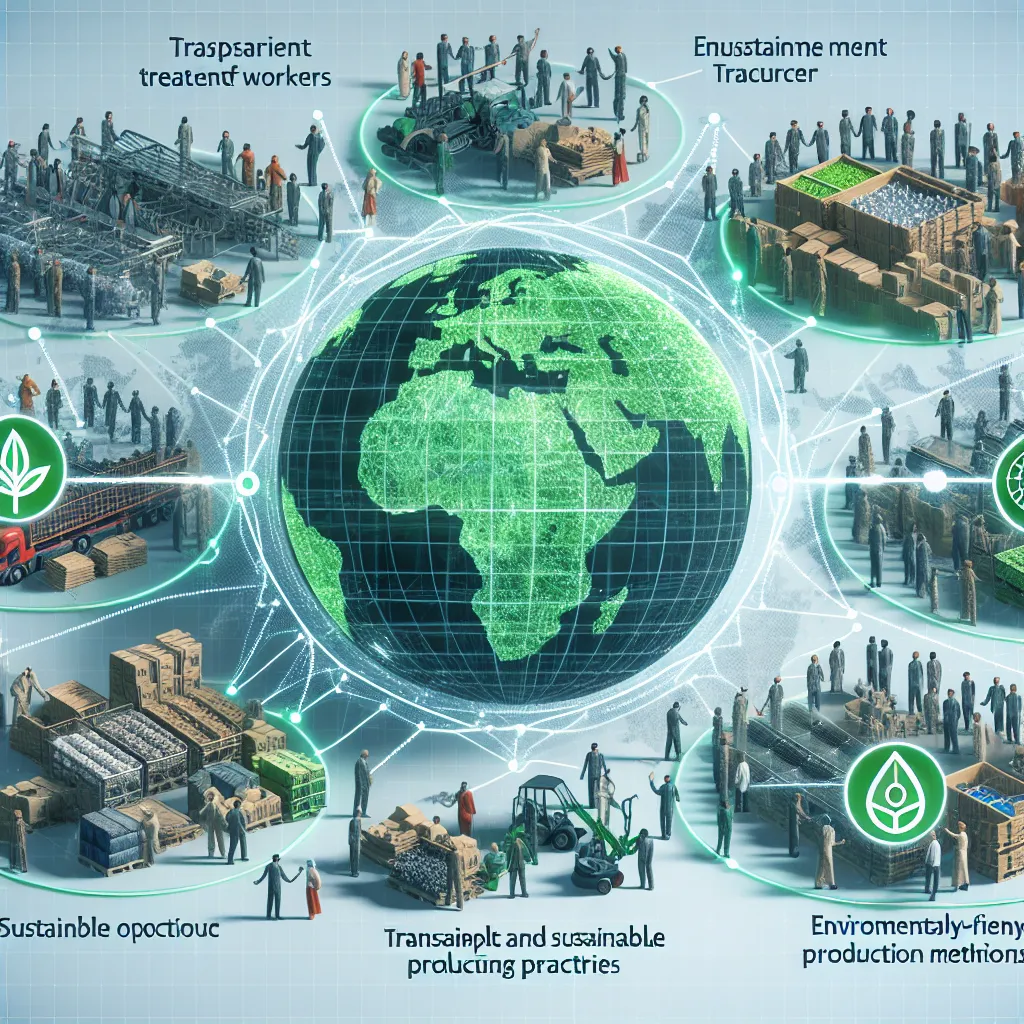The Importance of Ethical Sourcing in Sustainable Supply Chains
The Importance of Ethical Sourcing in Sustainable Supply Chains
When it comes to sustainability in the supply chain, ethical sourcing plays a pivotal role in achieving a truly sustainable and responsible model of operation. Ethical sourcing refers to the procurement of goods and services from suppliers who adhere to high social and environmental standards. This means that the products are not only produced in a manner that respects workers’ rights and ensures fair compensation, but also takes into consideration the environmental impact of the production process.
One of the key reasons why ethical sourcing is crucial in sustainable supply chains is its impact on brand reputation. In today’s socially conscious consumer market, more and more customers are making purchasing decisions based on a company’s ethical practices. By ensuring that products are ethically sourced, companies can build a positive brand image, gain customer loyalty, and ultimately drive profits.
Moreover, ethical sourcing contributes to the overall sustainability efforts by reducing the negative impact on local communities and the environment, thus creating a more sustainable future. By supporting suppliers who engage in ethical practices, businesses can actively contribute to the well-being of the communities where their products are sourced and manufactured.
In conclusion, ethical sourcing is not just a buzzword; it is a fundamental aspect of creating sustainable supply chains. By embracing ethical sourcing practices, businesses can balance profit with social and environmental responsibilities, ultimately paving the way for a more sustainable and ethical future.
Strategies for Balancing Profit and Sustainability in the Supply Chain
In the current global business landscape, companies are increasingly recognizing the importance of integrating sustainable practices into their supply chain operations. Achieving a balance between profitability and ethical sourcing has become a key concern for businesses seeking to align their operations with sustainable principles. To address this challenge, various strategies can be implemented to effectively balance profit with sustainability in the supply chain.
One strategy for achieving this balance is to conduct a thorough assessment of the entire supply chain to identify potential areas for improvement. By evaluating each stage of the supply chain, companies can pinpoint inefficiencies and areas where sustainability measures can be integrated without compromising profitability. This comprehensive approach enables businesses to make informed decisions that align with both their financial goals and their commitment to sustainable sourcing.
Collaborating closely with suppliers and fostering long-term partnerships is another effective strategy for balancing profit and sustainability. By working collaboratively with suppliers, companies can encourage ethical practices and promote sustainability throughout the supply chain. This may involve providing assistance and resources to suppliers to help them adhere to sustainable standards, thereby contributing to a more ethical and environmentally conscious supply chain.
Furthermore, leveraging technology and innovation can significantly contribute to the integration of sustainability into the supply chain while maintaining profitability. Implementing advanced technologies, such as blockchain and data analytics, can enhance supply chain transparency and traceability, enabling companies to ensure the ethical sourcing of materials and products. Additionally, embracing innovative solutions for energy efficiency and waste reduction can lead to cost savings and environmental benefits, aligning with both sustainability and profitability objectives.
Ultimately, finding the right balance between profit and sustainability in the supply chain requires a strategic and holistic approach. Through a combination of thorough assessment, strategic collaboration, and innovative adaptation, companies can effectively integrate sustainable practices into their supply chain operations while maximizing profitability.
Ethical Sourcing: Building a Sustainable Future for Supply Chains
Sustainability in the supply chain has become a crucial focus for businesses aiming to balance profit with ethical sourcing. Ethical sourcing, a key aspect of sustainable supply chain management, involves the procurement of goods and services in a manner that is not only economically viable but also socially and environmentally responsible. This approach aims to build a sustainable future for supply chains by ensuring that products are sourced in ways that minimize negative impacts on workers, communities, and the environment.
Companies are increasingly recognizing the importance of ethical sourcing, not only due to consumer demand for transparent and socially responsible practices but also because it helps to mitigate risks and protect brand reputation. By engaging in ethical sourcing practices, organizations can establish long-term relationships with suppliers based on trust, fair treatment, and accountability. This, in turn, fosters stability within the supply chain and contributes to the overall sustainability of the business.
Furthermore, ethical sourcing contributes to the well-being of workers and communities involved in the production process. This can encompass fair wages, safe working conditions, and support for local economies, thereby creating a positive social impact. Additionally, by prioritizing environmentally-friendly sourcing methods, such as using renewable resources and reducing carbon footprint, businesses can minimize their ecological footprint and contribute to environmental preservation.
In conclusion, ethical sourcing is instrumental in building a sustainable future for supply chains, as it aligns profit-driven objectives with responsible and conscientious practices. By integrating ethical considerations into sourcing decisions, businesses can cultivate resilient and ethical supply chains that not only yield financial benefits but also uphold social and environmental values.
Innovations in Supply Chain Management for Ethical and Sustainable Practices
As the global focus on sustainability and ethical sourcing continues to grow, companies are seeking innovative solutions to integrate these principles into their supply chain management. The pursuit of sustainability in the supply chain involves a delicate balance between profitability and ethical practices. To achieve this equilibrium, businesses are increasingly turning to innovations in supply chain management.
One such innovation is the implementation of blockchain technology to enhance transparency and traceability in the supply chain. By utilizing blockchain, companies can create a secure and immutable record of every transaction and movement of goods, providing unparalleled visibility into the origin of products and their journey through the supply chain. This not only combats issues such as illegal logging or conflict minerals but also builds trust with consumers who are demanding greater transparency and ethical sourcing.
Additionally, the concept of circular supply chains is gaining traction as a way to minimize waste and resource consumption. This approach involves designing products with an emphasis on longevity, reusability, and recyclability, and establishing closed-loop systems that enable materials to be repurposed at the end of their life cycle. Implementing circular supply chains requires collaboration across the entire supply chain network and the development of innovative reverse logistics processes.
Furthermore, advancements in data analytics and artificial intelligence are empowering companies to optimize their supply chain operations for greater sustainability. By leveraging big data analytics, businesses can identify inefficiencies, reduce carbon footprint, and enhance energy efficiency throughout the supply chain. AI-driven predictive maintenance and route optimization can minimize the environmental impact of transportation and distribution, contributing to overall sustainability goals.
In conclusion, the integration of innovative technologies and practices into supply chain management is critical for achieving ethical and sustainable sourcing goals. By embracing these innovations, businesses can effectively balance profitability with responsible supply chain practices, meeting the demands of both the market and the planet.

